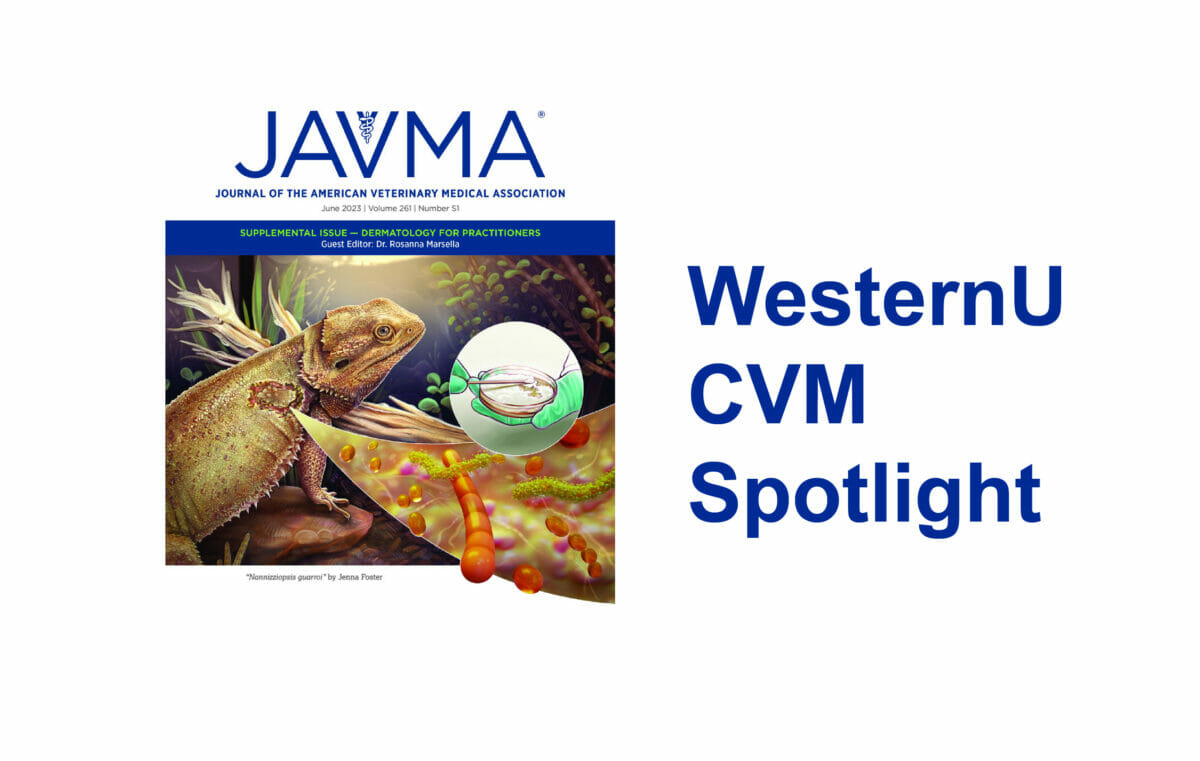
2023 AJVR & JAVMA Spotlights
In May 2023, the American Journal of Veterinary Research (AJVR) published a spotlight on Western University of Health Sciences College of Veterinary Medicine (WesternU CVM), focusing on advancing animal health and welfare through research. This spotlight, titled “Introducing canine lifestyle medicine and access to care in context of an interprofessional framework”, was followed in June 2023 by an additional spotlight in the Journal of the American Veterinary Medical Association (JAVMA) focusing on innovative approaches in teaching the next generation of veterinarians titled “Preparing veterinary students for interprofessional and systems-based practice”.
Feel free to enjoy both articles below, followed by summaries of some of the research and teaching activities here at WesternU CVM. These summaries highlight efforts from individual research labs, and/or teams united by a common theme or research interest.

AJVR Advancing animal health and welfare through research
Feline Infectious Peritonitis (FIP) is a devastating and often fatal viral disease that affects cats worldwide. Caused by the Feline Infectious Peritonitis Virus (FIPV), this highly contagious illness poses significant challenges for both veterinary professionals and cat owners. However, promising developments in antiviral research have recently emerged, offering hope for effective treatments. Dr. Sheema Mir and Dr. Mohammad Mir’s lab, conducted a comprehensive investigation into the molecular mechanisms FIPV replication and sought to identify novel therapeutic targets. Through meticulous experimentation, we discovered a compound that specifically targets the FIPV nucleocapsid protein, a crucial component for viral replication. By inhibiting the function of the nucleocapsid protein, the compound effectively disrupted viral replication in cell culture. This breakthrough finding brings hope for the development of effective antiviral treatments for FIP. The identification of a compound that can inhibit FIPV replication represents a significant milestone in the battle against this devastating disease. While the study was conducted in cell culture, it lays the foundation for further research and preclinical trials to evaluate the compound’s efficacy and safety in live animal models. If proven successful, this novel compound could open doors to the development of targeted therapies that directly combat FIPV, ultimately improving the prognosis for cats affected by the disease. The research findings highlight the importance of collaboration among veterinary professionals, researchers, and pharmaceutical companies in the field of feline medicine. The interprofessional framework allows for the exchange of knowledge, resources, and expertise, driving progress in understanding viral diseases and developing innovative treatments. Furthermore, the study underscores the significance of a comprehensive approach to feline health, incorporating principles of lifestyle medicine and improved access to care. By promoting preventive measures such as optimal nutrition, environmental enrichment, and stress reduction, we can enhance feline well-being and potentially reduce the risk of infectious diseases, including FIP.
Acknowledgment: CVM Office of Research for funding.

JAVMA Innovative approaches in teaching the next generation of veterinarians
The mission of the Evidence-Based Veterinary Medical Education Research Interest Group (EBVME-RIG) is to promote educational research and promulgate effective evidence-based educational practices in veterinary medical and other health professions education.
In 2022, the WesternU CVM Associate Dean for Research held a workshop encouraging research interest groups to submit a project proposal, competing for $10,000 grant funding. Our group worked diligently to submit a workshop program proposal entitled “Development of Educational Research Skills DoERS”. The primary goal is to develop the capacity of faculty to engage in social science research to evaluate the success of evidence-based educational interventions and improve teaching and learning. We anticipate descriptive, associational, and experimental studies utilizing qualitative, quantitative, and mixed methods research.
The DoERS Team includes Drs. Maria Fahie, Thomas Marino, Pedro Diniz, Paul Gordon-Ross and Peggy Barr. Additional faculty EBVME-RIG members include Drs. Beth Boynton, Ohad Levi, Kris Irizarry, Rhea Hanselmann, and Leslie McLaughlin. Funding was awarded through the WesternU CVM Intramural grant, a matching grant from the WesternU Office of Research and a $1000 AVMA Veterinary Educator Professional Grant. Two of the five workshops were delivered this Spring with guest speaker Dr. Katherine Fogelberg, DVM, PhD from VA-MD Regional College of Veterinary Medicine presenting qualitative research methods and Dr. Jason Siegel, PhD from Claremont Graduate University presenting survey research methods. The series continues this Fall with sampling and data collection, measuring outcomes, IRB submission and educational writing. At least 3 research projects are in process from this effort, including our own program assessment.

